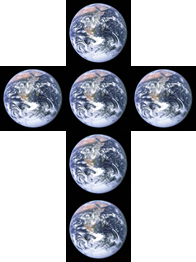“Partners in Health and Wholeness, an initiative of the North Carolina Council of Churches, is designed to bridge issues of faith, health and social justice.”
These are the words that you find on our website that explain why we do what we do. The NC Council of Churches and its program areas like Partners in Health and Wholeness (PHW) are inspired by a vision for faith communities that embraces the health of the whole person; mentally, physically, and spiritually. We realize there are many factors that impact our health, from the air we breathe to the neighborhoods we live in, from the water we drink to the food we eat. In the world of public health, these factors are referred to as determinants of health. Into this mix of health determinants comes climate change. According to the Centers for Disease Control, the impact a changing climate is having and will continue to have on our health is extensive and far-reaching. But, climate change has become one of those “avoid at the dinner table” topics. Reactions range from refusal to believe in climate change, through confusion or indifference, to fervent believers in the gravity of the problem.
In 2015 Pope Francis dominated headlines after the release of Laudato Si. The encyclical quickly became a clarion call for the faith voice to address the issue of climate change. Of course, Pope Francis is only the latest in a long line of faith leaders and faith traditions to assert we need to live differently if the earth’s systems are going to continue supporting human life. The United Methodists here and here, the Southern Baptists here and here, the Presbyterians here, the Lutherans here, the Buddhists here, and the Muslims here have all issued statements and made resolutions that say humanity needs to recognize the role we are playing in climate change and consider our role in caring for creation.
Ethicists and theologians have been prolific over the last decades explaining why the faith community should care about climate change. They have made the case that faith voices should do more than pray and sing or debate and preach about the issue. We must also act individually and collectively. So, what is missing? Why do some life-long people of faith insist energy efficient light bulbs are a government conspiracy? Why do many social justice activists with strong faith convictions, working on the front lines in our disadvantaged communities, insist they are too busy with real life problems to do anything about climate change?
Climate change is a faith matter; climate change is a justice issue. Still, many of us wonder if there is anything we can do at the local level. All the talk about ecological ethics and eco-theology gives us the knowledge for why it matters, but often offers no practical advice on how to make a difference. The economic voice weighs the financial costs and the scientific voice offers factual data, but the faith voice is muted while we struggle to define a direction around which we can coalesce. This is why Laudato Si is like “the shot heard round the world.” Across the globe, faith communities have latched on to the ideas contained in the encyclical, not because Pope Francis was saying something new, but because his encyclical kindles our imagination and appeals to our best instincts which tell us, we need to act now.
Wherever you fall on the spectrum, skeptic or confirmed believer, it is time to imagine new possibilities. Possibilities that allow us to confess that not only does humanity matter, but so does the earth we inhabit; possibilities to say yes, we will not allow our progress to exploit the very environment that keeps us alive. As we are reminded in Genesis 1:26, we are stewards of creation; the way things are now is not the way they have to be.
People of faith can start with our faith communities, even as we begin to change our everyday habits. There are programs in place (many of which were linked to above), educational resources available, and pledges and petitions for us to circulate.
Consider having your faith community do a free energy audit as a part of working towards PHW certification. Explore the free resources at NC Interfaith Power & Light, a program area of the NC Council of Churches, and choose one or two that are relevant to your congregation. Finally, this month offers an opportunity to join other faith communities across the world for The Season of Creation, which runs from September 1 to October 4.
We at PHW will continue to explore the impact of climate change on particular aspects of health and wholeness in all our lives. Stay tuned for more ways you can positively impact your environment, which will positively impact your health.
Give us all a reverence for the Earth as your own creation, that we may use its resources rightly in the service of others and to your honor and glory. — The Book of Common Prayer, U.S.A

